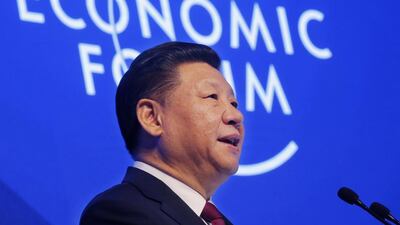DAVOS // President Xi Jinping of the People's Republic of China used his country's first top-level attendance at the World Economic Forum (WEF) annual meeting to issue a strong defence of globalisation and a denunciation of protectionism and populism.
"Many of the problems troubling the world are not caused by economic globalisation," Mr Xi told a packed opening plenary session.
He cited the global refugee crisis as an example. "There is no point in blaming economic globalisation for the world's problems, as that is not the case and will not help with solving the problems."
But he warned, "We should recognise that economic globalisation is a double-edged sword. The pitfalls of economic globalisation have been laid bare and we need to take these seriously."
"Nothing is perfect in the world. It is true that economic globalisation has created new problems. But this is no justification to write off economic globalisation altogether," he added.
His historic speech at Davos was claimed by the WEF as a big success after recent criticism of the organisation's failure to do more to alleviate global inequality, and the threat posed by the protectionist policies of the US president-elect Donald Trump and the UK Brexit deliberations.
Klaus Schwab, the founder and executive chairman of WEF, welcomed what he called a "very important and historic speech. It has brought some sunlight into our discussions."
Mr Xi said the global financial crisis was caused by excessive profit and a failure of market regulation, not globalisation.
The global economy was sluggish, he said, because of a lack of a robust driving force, inadequate governance and uneven international development.
"We need dynamic innovation to drive growth, a new development philosophy rather than a debate about fiscal or monetary policies and new global systems," he said.
He referred several times to policies thought to be favoured by the new American administration. "We have got to promote free trade and liberalisation and say 'no' to protectionism. Nobody would be a winner in a trade war," he said.
China would continue to hold its door open to foreign trade and investment, and it had no intention of devaluing its currency, the yuan.
Mr Trump has accused China of artificially manipulating the value of the yuan. He also borrowed from the American political legacy, declaring: "We need a people-oriented development philosophy, a development of the people, by the people, for the people."
Mr Xi committed China to the environmental goals agreed at the Paris Accord, in contrast to Mr Trump's scepticism on climate change.
He sprinkled his 45-minute talk with literary references and Chinese mottos, borrowing from Charles Dickens's Tale of Two Cities, the Arabian Nights folk tales and Greek mythology.
Some saw it as a thinly veiled attack on the incoming president Mr Trump ahead of his inauguration this week, and on Theresa May, the UK prime minister due to arrive in Davos today to explain her Brexit strategy.
"He sounds more like the president than our new president," said an American businessman who asked not to be named.
The speech was welcomed by Arabian Gulf business people at Davos. "In this age of fear of increasing populism and protectionism, president Xi's remarks were a refreshing counterbalance in support of the positive aspects of globalisation, while still recognising the pitfalls of uncontrolled and unequal growth," said Badr Jafar, the chief executive of the UAE's Crescent Enterprises.
Talal Malik, the Saudi-based chief executive of Alpha1Corp, a conglomerate that works with the Chinese leadership, said: "It was valuable today to hear a Chinese president reaffirm that, despite all the disruptions taking place in the world, all countries have converging interests."
business@thenational.ae
Follow The National's Business section on Twitter

China’s Xi defends globalisation at WEF annual meeting in Davos
'Many of the problems troubling the world are not caused by economic globalisation,' Xi Jinping told a packed opening plenary session.
Most popular today
